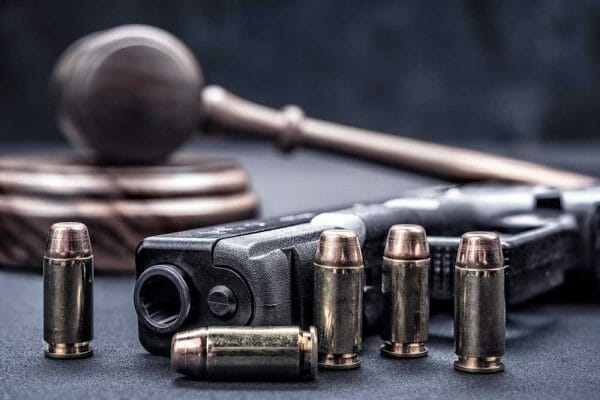
U.S.A. –-(AmmoLand.com)- When the U.S. Supreme Court convenes Wednesday, Nov. 3 to hear oral arguments in the case of New York State Rifle & Pistol Association v. Bruen, it won’t be the Second Amendment on trial, but the extremist gun control law in New York state requiring applicants for a permit to carry a gun for personal protection to show some “special need” to exercise a constitutionally enumerated fundamental right.
Writing at Vox, Senior Correspondent Ian Millhiser seems to lament, “For nearly all its history, the Supreme Court kept its distance from gun policy. Now it’s about to decide a case that could radically reduce the government’s power to regulate guns.”
With due respect to Millhiser, that’s what every tenet of the Bill of Rights is supposed to do, limit the government’s power. The fact self-described “progressives” (make that liberals) are concerned about this probably says more about their motives and goals than they care to acknowledge.
Millhiser contends “The Second Amendment states explicitly that it exists to protect “a well regulated Militia…”
No, gun rights activists could argue, it doesn’t really say that at all, as the late Justice Antonin Scalia explained in his majority opinion in District of Columbia v. Heller in June 2008.
Millhiser refers to the 1939 case of United States v. Miller to argue the high court’s unanimous ruling in that case—for which there was no argument for the defendant before the court—showed the “’obvious purpose’ of the Second Amendment was to ‘render possible the effectiveness’ of militias, and the amendment must be ‘interpreted and applied with that end in view.’
But Justice Scalia, on Page 49 of the Heller decision, put that argument in its place.
“JUSTICE STEVENS,” Scalia wrote, “places overwhelming reliance upon this Court’s decision in United States v. Miller, 307 U. S. 174 (1939). ‘[H]undreds of judges,’ we are told, ‘have relied on the view of the amendment we endorsed there,’…and ‘[e]ven if the textual and historical arguments on both sides of the issue were evenly balanced, respect for the well-settled views of all of our predecessors on this Court, and for the rule of law itself . . . would prevent most jurists from endorsing such a dramatic upheaval in the law,’… And what is, according to JUSTICE STEVENS, the holding of Miller that demands such obeisance? That the Second Amendment ‘protects the right to keep and bear arms for certain military purposes, but that it does not curtail the legislature’s power to regulate the nonmilitary use and ownership of weapons.’ …
“Nothing so clearly demonstrates the weakness of JUSTICE STEVENS’ case,” Scalia added. “Miller did not hold that and cannot possibly be read to have held that.”
The Citizens Committee for the Right to Keep and Bear Arms, a grassroots gun rights organization with some 650,000 members and supporters across the U.S., filed a solo amicus brief in this case. The New York organization is a CCRKBA affiliate, and the amicus looks at the history of the Amendment, explaining powerfully, “The Founders understood that, even if the written Constitution delivered the benefits they hoped for, man’s essential nature meant that civilization was inherently fragile and prone to violent flareups. All the more so given the federal system of shared sovereignty: brief or prolonged episodes of violence and mayhem in response to local conditions were inevitable.
“Thus ‘the right of the people to keep and bear Arms, shall not be infringed by any sovereign,” the CCRKBA brief adds. “With this backdrop, it is folly to even suggest that the Founders believed the people ceded to any government official—let alone a local sheriff —the power to condition the right to bear arms on some sort of heightened showing of ‘cause’ or ‘need.’”
What the high court could do with the NYSR&PA case is not “radically reduce the government’s power to regulate guns,” but instead put the government in its place, like that of a servant of the people, not the master.
New York is one of a handful of states with such a restrictive approach to regulating the exercise of a constitutional right to bear arms. Thus, if the Court rules against the law, it also jeopardizes similar laws in other states including Massachusetts, New Jersey, Maryland, California, and Hawaii.
Rights activists have long contended citizens should not be required to demonstrate some “special need” in order to carry a firearm outside the home for personal protection. Bearing arms, they stress, is a right, specifically enumerated in the Constitution’s Bill of Rights.
Writing at SCOTUSblog, Amy Howe (former editor and reporter for that site) states, “Both sides in the case agree that the Constitution protects a right to carry a handgun outside of the home for self-defense, but they have very different views on whether and when the government can place restrictions on that right. The court’s decision is likely to be a major ruling on gun rights, and it could hinge on the justices’ view of the history of gun rights in England and the United States – a history that, like the right itself, the parties to the case hotly dispute.”
She lays out arguments on both sides fairly and in detail.
“The high stakes in the case are reflected in the number of ‘friend of the court’ briefs filed on both sides – over 80 in total, including one from the Biden administration supporting New York,” Howe notes.
Alan Gottlieb, founder and executive vice president of the Second Amendment Foundation—which joined in a separate amicus brief in this case—perhaps summed it up best earlier this year when he observed, “A right limited to someone’s home is no right at all, and the court now has an opportunity to make that abundantly clear, settling an important constitutional issue once and for all.”
RELATED:
- Gun Control’s Racist Roots Exposed in Supreme Court Brief
- What Courts Can and Cannot Do For the Second Amendment
About Dave Workman
Dave Workman is a senior editor at TheGunMag.com and Liberty Park Press, author of multiple books on the Right to Keep & Bear Arms, and formerly an NRA-certified firearms instructor.

